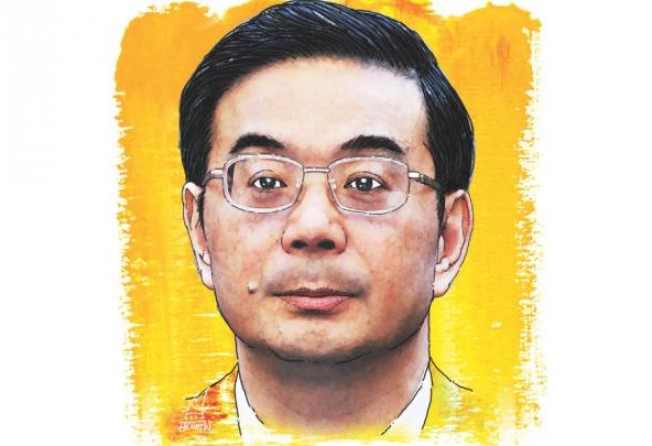
Hunan stalwart Zhou Qiang set for Politburo despite Li Wangyang scandal
The party secretary of a troubled province is regarded as a reformist and a strong bet for the Politburo but he may be too low-key for some

Despite a recent series of scandals in Hunan , provincial party secretary Zhou Qiang is still seen as a contender for promotion to the powerful Politburo at the Communist Party's upcoming 18th national congress.

Zhou became head of the youth league in 1998, at the age of 38, and headed it for eight years before becoming acting governor of Hunan in late 2006. He was named governor the next year and went on to succeed Zhang Chunxian as provincial party secretary in 2010.
Now 52, he is the third-youngest regional party secretary. If Zhou is appointed to the Politburo at the party congress it will be a major political boost for the tuanpai, with his relative youth putting him in pole position for membership of the all-powerful Politburo Standing Committee at the party's 19th national congress in five years' time.
Zhou studied at the Southwest University of Political Science and Law in Chongqing , receiving a master's degree in law, and then worked in the Ministry of Justice. Between 1993 and 1995 he was secretary to then justice minister, Xiao Yang , an open-minded official who later became president of the Supreme People's Court.
Zhou's interest in reform of the justice system became apparent in March last year when Li Jiang , then head of the party's political and legal affairs commission in Hunan, surprisingly accepted an interview with the South China Morning Post on the sidelines of the annual session of the National People's Congress in Beijing.
Dozens of top law-enforcement officials at the NPC meeting were asked whether they were willing to be interviewed, but only Li accepted. And he dropped a bombshell, confirming for the first time that the party's central Organisation Department had issued an order in 2010 banning the practice of officials heading political and legal affairs panels and police forces at the same time - in order to create a "fairer legal system".
The practice has long been criticised because it effectively makes a jurisdiction's police chief the boss of its top judge and top prosecutor, who are usually members of the panel.
Li said the move meant that he would be resigning as provincial police chief.
A legal source in Hunan said the interview had undoubtedly been authorised by Zhou, who was keen for Hunan to be seen as one of the first provinces to implement the reform. It proved to be a short-lived, however, with the two positions once again held by one person - Sun Jianguo - in Hunan late last year.
Zhou's commitment to rule of law, and his political prospects, have been called into question in recent months, with a string of scandals breaking out in Hunan.
Tiananmen activist Li Wangyang was found dead in mysterious circumstances in a hospital in Shaoyang in June, while a woman was sent to a labour camp last month for petitioning after her 11-year-old daughter was kidnapped, raped and forced into prostitution in Yongzhou a few years ago.
Zhou told a group of visiting Hong Kong reporters in August that there was plenty of evidence showing that Li - who was 62 years old, physically fragile, nearly blind and deaf - had committed suicide and that none of Hunan's more than 60 million residents had raised any suspicions.
A media source in Hunan who has met Zhou a number of times in recent years said the party chief was like a gymnast who always performed the compulsory exercises correctly and cautiously, but never attempted any optional exercises that might exhibit creativity or free will.
"I can't remember a single story about a personal trait that is interesting enough to warrant circulation," the source said.
"He doesn't seem to have enough self-confidence. Why else would he maintain a tight grip over the media and fail to do anything significant in Hunan in the past few years?"
The source said many journalists in Hunan preferred the more liberal era under Zhang, while others hoped that popular governor Xu Shousheng would soon succeed Zhou.
"They often say privately that Zhou's low-key character might make him more suited to be president of the Supreme People's Court than a top regional official," the source said.
Some China-watchers say that it is unusual for the state-controlled media to expose the dark side of a province ruled by a political star, hinting that some of Zhou's rivals may be trying to paint him in a bad light.
But Chen Ziming , a Beijing-based independent political analyst, said he was confident Zhou would be promoted in the near future.
"When you talk about experience and qualifications, Zhou boasts the advantage for serving as a regional governor and party head … moreover, he has been a provincial-level official for more than 14 years," Chen said.
"At the moment I would rate Zhou's chances of winning a seat on the Politburo at the party congress at 70 to 80 per cent.
"I'm pretty sure the scandals will not be an obstacle to Zhou's promotion, as long as the party's upper echelon has decided to put him in a key post."
The media source added: "Despite his dullness and cautiousness, at least Zhou is a good and decent guy who is unlikely to do anything malicious or evil."